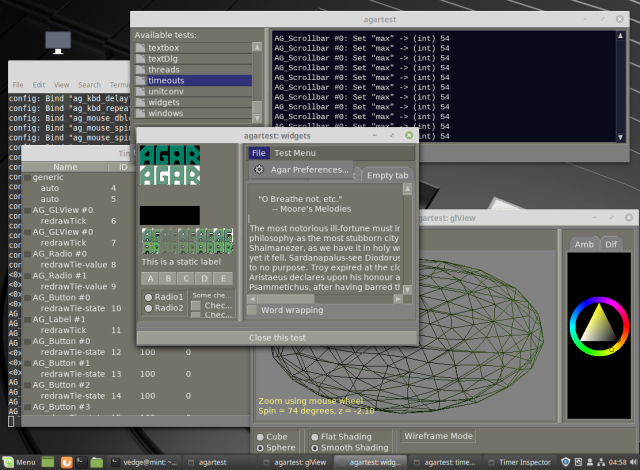Installing Agar on other Unix-like platforms - LibAgar
This guide describes how to compile and install libagar under Unix-like platforms other than Linux and *BSD. Before compiling, you might want to search the ports/packages collection for an Agar package. However, if an available package is outdated compared to the most recent release of Agar, we recommend installing from source instead.
Agar works best with OpenGL and the FreeType font engine installed. Provided that you have a modern X.org installation, those components should be already installed on your system.
Agar uses the native X.org API by default, but Agar applications can be made to work over SDL 1.2 as well.
Some optional Agar features also make use of the jpeg, png
and iconv libraries if they are available.
Under the SGI IRIX platform, we recommend compiling Agar using gcc3
or SGI cc (there are varargs-related problems with gcc 2.95). You can
download .tardist packages gcc3 (as well as SDL, freetype, etc.)
from nekochan.net.
First download the Agar source package and unpack it to a temporary location:
$ wget http://stable.hypertriton.com/agar/agar-1.7.1.tar.gz $ tar -xzf agar-1.7.1.tar.gz $ cd agar-1.7.1
Then configure and compile the sources. There are a number of build
options available (see ./configure --help), but the defaults should
be fine unless you have specific requirements.
The --enable-debug option is recommended for developers since it
enables run-time assertions and type safety checking.
--disable-threads will improve performance is thread-safety is not
needed.
$ ./configure --prefix=$HOME # Install to some alternate location $ ./configure --enable-debug # For developers $ ./configure --disable-threads # Disable support for multithreading $ make all
Finally, install the library. This will install under the /usr/local
by default (you can use the configure option --prefix to install to an
alternate location).
# make install
On some platforms, installing shared libraries requires that you refresh the dynamic linker cache. Refer to your operating system's documentation on how to do this.
You can test that Agar is working using a simple hello.c program like so:
#include <agar/core.h> #include <agar/gui.h> int main(int argc, char *argv) { AG_Window *win; if (AG_InitCore(NULL, 0) == -1 || AG_InitGraphics(0) == -1) { AG_Verbose("Init failed: %s\n", AG_GetError()); return (1); } win = AG_WindowNew(0); AG_LabelNew(win, 0, "Hello, world!"); AG_WindowShow(win); AG_EventLoop(); return (0); }
Compile this example using:
$ cc -o hello `agar-config --cflags` hello.c `agar-config --libs`
The tests directory contains a test suite named agartest:
$ cd tests $ ./configure && make # make install $ ./agartest $ ./agartest -C # Console output to terminal $ ./agartest -s blue.css # Alternate stylesheet $ ./agartest -t Courier:12 # Alternate font $ ./agartest -d sdlfb # Alternate graphics backend (SDL) $ ./agartest -d 'glx(stereo)' # Stereoscopic display under X $ ./agartest -d 'sdlgl(out=%08d.jpg)' # Capture frames to JPEG files


